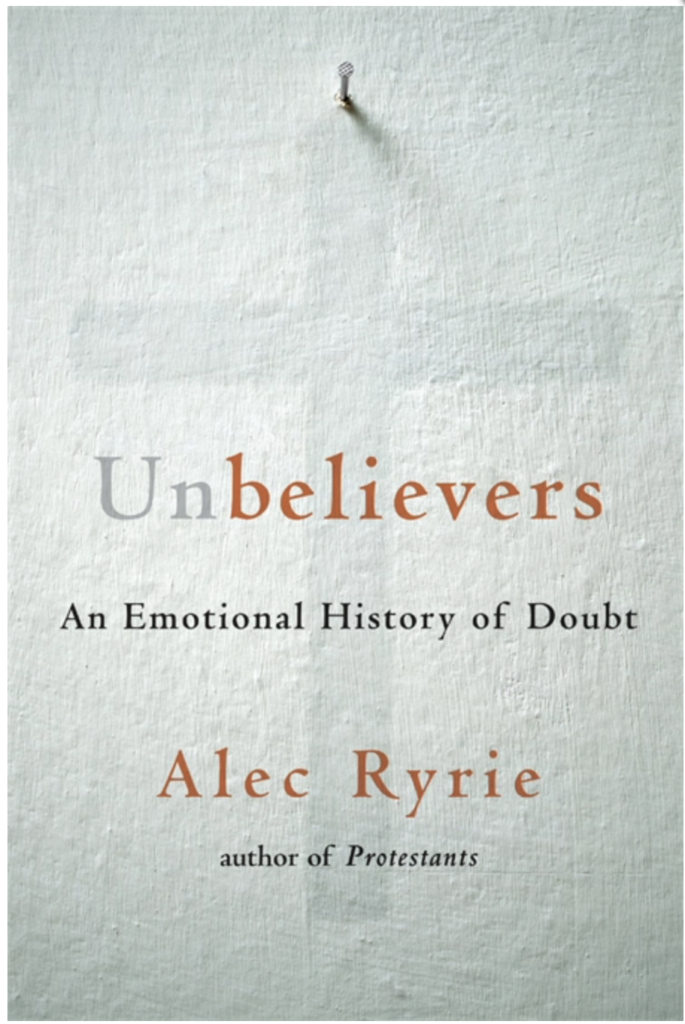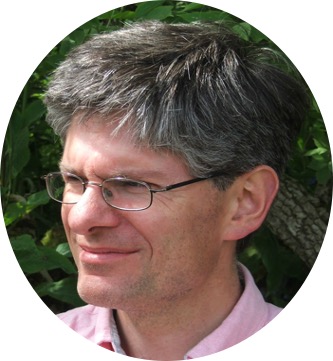
Unbelievers: An Emotional History of Doubt
Alec Ryrie
Adapted from UNBELIEVERS: AN EMOTIONAL HISTORY OF DOUBT BY ALEC RYRIE, published by The Belknap Press of Harvard University Press (2019).
Why,” the philosopher Charles Taylor asks, “was it virtually impossible not to believe in God in, say, 1500 in our Western society, while in 2000 many of us find this not only easy, but even inescapable?” Indeed, many of those who (like Taylor himself) continue to believe are conscious of swimming against a cultural tide. Over a century ago, Friedrich Nietzsche notoriously claimed that “God is dead . . . and we have killed him.” In large and growing parts of Western society, that shocking claim has turned into a self-evident truth.
As a historian, my question is: who killed God, when, and how? The usual answer is: philosophers, scientists and intellectuals; during the Enlightenment and scientific revolution of the eighteenth and nineteenth centuries; and by means of a frontal assault.
In the 1660s, so the story goes, Baruch Spinoza first showed that a world without God could be philosophically coherent. In the eighteenth century there was a double assault: polemicists such as Voltaire and Thomas Paine openly attacked the Church’s moral authority, and philosophers as varied as David Hume, Immanuel Kant, and Jean-Jacques Rousseau constructed systems which, whether or not we classify them as strictly atheist, left Christianity far behind. God became, as Pierre-Simon Laplace supposedly told Napoleon in 1802, a redundant hypothesis. Nineteenth-century philosophers as varied as Ludwig Feuerbach and Arthur Schopenhauer found the case against religion to be almost self-evident. By the time Charles Darwin provided an explanation for the origins of life without reference to God in 1859, the work was virtually completed. All that the wider culture has done since then is catch up. I wrote this book because I am not satisfied with that stereotypical account. The timescale, the suspects, and the nature of the murder are all wrong. Telling the story a different way not only changes our sense of history; it casts our current moment of pell-mell secularisation in a different light.

The death-by-philosophy narrative is a poor fit with the actual chronology of Western secularisation. Were the religious revivals of the later eighteenth and nineteenth centuries or the apparent Christian resurgence across the West in the 1950s simply religion’s death throes? Was the sudden collapse of the West’s religious cultures in the 1960s merely the shattering of a husk after centuries of patient hollowing-out? Even if you can explain away this chronological mismatch, the conventional starting point is plainly wrong. If atheism only became a live possibility in the 1660s, how could John Bunyan, who was nobody’s intellectual elitist, depict an assertive and recognisable “Atheist” in the 1670s? How could it be said in the 1620s that there were fifty thousand atheists in Paris, or in the 1590s that “there is no Sect now in England so scattered as Atheism”? How could a preacher in Florence in 1305 warn that the question “how can it be that God exists?” was being “put by madmen every day”?
These early testimonies to unbelief are often dismissed on the grounds that they lacked philosophical sophistication. If you are only interested in the history of “atheism” as a system of ideas then that is the end of the matter, and my book is not for you. What interests me is that unbelief clearly existed in practice (in some form, at some level) before it existed in theory. In which case we have not only been looking at the wrong centuries, but profiling the wrong suspects. Intellectuals and philosophers may think they make the weather, but they are more often driven by it. People who read and write books, like you and me, have a persistent tendency to overestimate the power of ideas. Some of us may occasionally change our beliefs and our lives as the result of a chain of conscious reasoning, but not very often or very honestly.
Our own age has forcibly reminded us that intellectual elites often struggle to bring their societies with them. Their default role is to tag along, explaining with perfect hindsight why things have inevitably turned out as they did.
The conventional story has it that philosophers attacked religion and people therefore stopped believing. But what if people stopped believing and then found they needed arguments to justify their unbelief? “The heart has its reasons of which reason knows nothing,” cautioned Blaise Pascal, the seventeenth century’s shrewdest wrestler with doubt. Apart from a heroic or cold-hearted few, most of us make our lives’ great choices — beliefs, values, identities, purposes — intuitively, with our whole selves, embedded as we are in our social and historical contexts. We are usually unable to articulate why we have made these choices, and are often not even aware we have made them. If we have the inclination, we might then assemble rationalisations for our choices: rationalisations which may be true, but in a meagre, post hoc way.
I think we all know that those who choose religious belief do so for such instinctive, inarticulate, intuitive reasons. My point, simply, is that those who choose unbelief do the same thing. In which case, the crucial juncture in the history of atheism is the period before the philosophers made it intellectually respectable, when the raw dough began to bubble with unexplained energy, making it urgent that intellectuals discover ways to bake, slice and package it. It is no great surprise that Enlightenment thinkers could develop atheistic philosophies. Anyone who needs a philosophy badly enough will find one, and arguments against God and against Christianity’s core doctrines were nothing new in the mid-seventeenth century. The question is not where did these criticisms come from, but rather why did some people start to find them compelling? To answer that question, we do not need an intellectual or philosophical history of atheism: we need an emotional history.
My book tells two interwoven emotional stories of unbelief: stories of anger and of anxiety. Anger is the more obvious of the two: grudges nurtured against an all-embracing Christian society, against the Church in particular, and often also against the God who oversaw it all.
The unbelief of anxiety was a quite different experience: the unsettling, reluctant inability to keep a firm grip on doctrines that people were convinced, with their conscious minds, were true. On their own, neither of these perennial emotions threatened Christendom. If anything, they were part of the moral equilibrium and self-renewal of a thriving Christian society. What made them dangerous was the Protestant Reformation, which deliberately turned angry unbelief into a weapon of mass theological destruction, and in the process stirred up anxious unbelief like never before. The result was a strange convergence of the two emotional streams. Anger became increasingly righteous in tone: “atheists” were universally assumed to be depraved monsters, but angry unbelief turned into a moral revolt and began to find its own, distinct ethics. Meanwhile, as anxious unbelievers found that everything they tried to grapple with turned to mist and shadows, some of them despaired of finding doctrinal certainties and fastened their grip onto ethical certainties instead. So the angry and the anxious found themselves allying against traditional Christianity, opposing it not principally on intellectual grounds but on moral ones.
The emotional history of Western atheism, then, is not a story of an external assault on Christianity. It is a story of Christians and post-Christians attacking it from within, and doing so from the moral high ground. When some of them reached the point of wanting to abandon or abolish God, it was not because of their intellectual rationalisations, but because their ethics and even their theology demanded it. As the sociologist Peter Berger has observed, “historically speaking, Christianity has been its own gravedigger.” This is not chiefly because it generates intellectual critiques of itself. Rather, it generates moral critiques of itself: an operation so successful that, in parts of the Western world, the patient now seems in real danger of death. Whether the story will end that way, or whether Western religion will find that what does not kill it makes it stronger remains to be seen. My point is simply that the history of unbelief follows a dynamic established in the sixteenth and seventeenth centuries. This dynamic is not separate from the history of belief. It is part of it.
In writing an emotional history of atheism, I am not arguing that atheism is irrational. I am arguing that human beings are irrational; or rather, that we are not calculating machines, and that our “choices” about what we believe or disbelieve are made intuitively, with our whole selves, not with impersonal logic.
No one can, of course, actually be objective on this subject. We were born into this world and we’re going to die here; we all have a stake and are forced to make our wager. But I am not advocating for either side, and although I myself do come down on the side of belief, I hope readers will find that I have treated unbelievers with due respect — if not always with kid gloves. This is one reason why, throughout the book, I write about what “you” or “we” might have experienced as a mediaeval or early modern believer or unbeliever, rather than using the easy, distancing impassivity of pronouns like “one” or “they.” I think it is worth the imaginative effort of trying to put ourselves in their place.
Happily, since I am convinced that arguments as such have precious little bearing on either belief or unbelief, there is no danger of a book such as this converting anyone to or from anything. Nor, of course, is that its aim. My hope is instead that believers and atheists alike might understand better how unbelief has gone from feeling intuitively impossible to feeling, to many people, intuitively obvious; and how, during the long and fractious marriage between faith and doubt, both partners have shaped each other more than they might like to admit. “If you want to understand atheism and religion,” says the steely atheist John Gray, “you must forget the popular notion that they are opposites.” My purpose is merely to remind both parties how long their fates have been intertwined and how much they owe to one another, not least so they might be willing to talk and to listen to one another again. ♦
Copyright © 2019 by Alec Ryrie. Used by permission. All rights reserved.

Alec Ryrie is a Professor of the History of Christianity at Durham University, professor emeritus of Divinity at Gresham College, London, co-editor of the Journal of Ecclesiastical History and a Fellow of the British Academy. His books, as well as Unbelievers: An Emotional History of Doubt (2019), include Protestants (2017) and The English Reformation: A Very Brief History (2020). His YouTube lectures relating to Unbelievers and other subjects at can be found here.
Recommended Citation
Ryrie, Alec. “Unbelievers: An Emotional History of Doubt.” Canopy Forum, January 10, 2023. https://canopyforum.org/2023/01/10/unbelievers-an-emotional-history-of-doubt/

